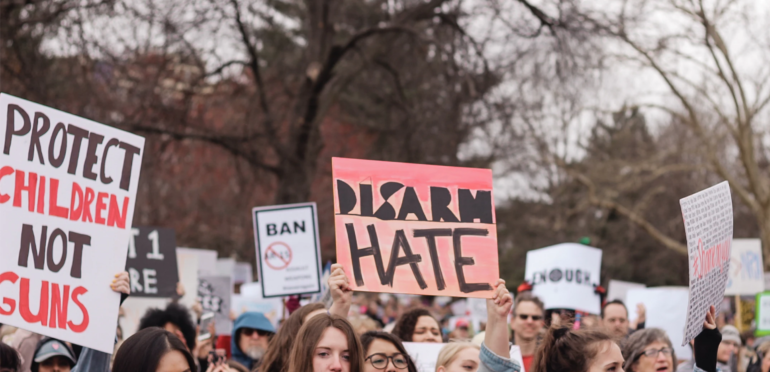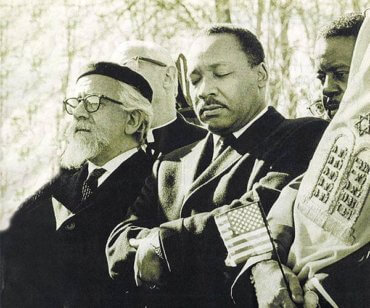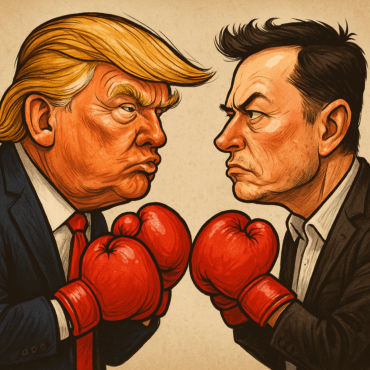
What Does Judaism Say About Gun Rights?
Hi JITC-
What does Judaism say about gun rights?
Thanks,
Emma
Dear Emma-
Thanks for your timely question. Before we get into it, I’d like to preface by saying that, whatever we determine the Torah’s position to be, it does not necessarily mandate a political position for us. For example, the Torah permits slavery and polygamy, which were the societal norms at the time in which it was given. Not only does this not obligate us to practice these things, I know of no religious authority who would advocate for making these practices legal in contemporary society. Man is permitted to outlaw that which the Torah permits.
Conversely, the Torah does not permit us to drive on the Sabbath, nor to eat non-kosher foods. Nevertheless, I know of no religious authority who maintains that we have the right or the obligation to impose these moral values as secular law. The Torah’s rules are for us to follow, not for us to impose on others.
Accordingly, even if I conclude that the Torah permits unfettered gun ownership, I can still advocate for restrictions. Similarly, if I conclude that the Torah prohibits gun ownership, that would only be a moral guideline for my own behavior; it doesn’t mean that I have the right or the responsibility to expect it of others. Our conclusions here are not intended as political mandates either way.
With that in mind, I have observed that sometimes people’s religious interpretations are informed by their political views, rather than the other way around. This leads people to perform some incredible mental gymnastics, presenting the point of some religious dictum as the opposite of what it really means. I’m going to try my best to avoid that.
Quite a few years ago, I read a piece in which I think the writer fell victim to that urge and read the sources through the prism of his preconceptions. He presented the prohibition against owning a vicious dog (Baba Kama 79a) as ironclad proof that gun ownership is prohibited, overlooking a significant difference between the two cases: a dangerous dog is a living creature that has a mind of its own. A violent dog is capable of attacking innocent victims without any human catalyst; a gun can be misused but it can’t misuse itself. (I know that, for some, this observation might be uncomfortably close to the pro-gun slogan “guns don’t kill people; people kill people” but the Ramban comments on Genesis 4:23 that swords don’t choose to kill people and they bear no responsibility for their actions, so the idea has precedent.) Accordingly, the law about a dangerous dog may be important for our discussion but that author’s conclusion might be a little premature.
Let’s start with a verse in the Torah. As we discussed recently, Deuteronomy 22:8 obligates us to install a fence on the kind of flat roof that people use, such as those on modern apartment buildings; this is to prevent the possibility of innocent people falling. The Torah’s operative phrase “so there should not be blood on your house” is the basis of a general halachic rule against allowing any hazardous condition to remain unchecked (Baba Kama 15b). This general prohibition would include the aforementioned ban against owning a vicious dog, though there are mitigating circumstances that would permit it, such as if the dog is kept on a chain (Choshen Mishpat 409:3). From here we see that something dangerous might be permitted if reasonable precautions are taken. Additionally, the gemara tells us (Baba Kama 83a) that one can have a guard dog in a city that’s close to the nation’s border (i.e., an area in potential danger), so what’s prohibited in one place because it poses a hazard might be permitted in another out of necessity.
Similar to this, I think, is the case of a certain type of spiked sandal that the Talmud (Shabbos 60a) tells us may not be worn on Shabbos. The gemara explains that, during a period of persecution, a group of fugitive Jews hid in a cave where they were permitted to enter but not to leave for fear that the enemy might find them. One of these fugitives accidentally strapped his sandals on backwards, which made his incoming footprints look like outgoing footprints. This created a panic during which the people hiding in the cave pressed together, impaling one another on their spiky shoes. The gemara tells us that they inflicted more damage on one another than the enemy caused. This led to the ban on spiked sandals. But why were they prohibited only on Shabbos? If they’re so dangerous, shouldn’t they be prohibited on weekdays as well? The answer is that on Shabbos, people gather together in large crowds, so such shoes present a danger on that day. This is not the case on weekdays, so spiked sandals do not present as large a threat. We see again that “danger” is contextual and not absolute.
In terms of practical halacha, the Shulchan Aruch (OC 151:6) writes that some authorities prohibit entering a shul carrying one’s weapons. Some later authorities, such as the Tzitz Eliezer, differentiate between exposed and concealed weapons, permitting a holstered weapon or even a gun whose bullets have been removed, thereby negating its status as a weapon. And the restriction doesn’t apply at all to a soldier, a police officer or a security guard who needs his (or her) weapon for the protection of others.
While weapons appear to be generally permitted, it should be noted that the Talmud (Avoda Zarah 15b) specifically prohibits the sale of weapons to people whom we have reason to believe may use them for nefarious purposes. This seems analogous to our modern background checks and waiting periods.
In conclusion, I would like to point out that, while owning weapons might be permitted in halacha, it’s not a badge of pride. The mishna in tractate Shabbos (6:4) prohibits a person going out on Shabbos carrying weapons. Rabbi Eliezer suggests that it should be permitted because a man’s weapons are ornaments for him but the Sages shoot down that idea, saying that having to carry weapons is disgraceful. To support their assertion, the Sages cite Isaiah 2:4, “They will beat their swords into plowshares and their spears into pruning hooks; nation will not lift sword against nation and they will not make war any longer.”
Weapons are not ornaments, nor are they toys; they’re a necessary evil and it’s sad that we have to rely upon them. The extent to which they are permitted largely depends on the safeguards that one implements and whether a particular situation is more dangerous with or without them. As with most things, the Torah position reflects the “middle path” of moderation. Therefore, using Torah sources to support either extreme is probably inaccurate and potentially disingenuous.
Sincerely,
Rabbi Jack Abramowitz
JITC Educational Correspondent
Follow Ask Rabbi Jack on YouTube
If you found this content meaningful and want to help further our mission through our Keter, Makom, and Tikun branches, please consider becoming a Change Maker today.








1 comment
Sort by
In a world where people come into shuls and shoot people, it is unreasonable to expect Jews to remain defenseless. Yes, we should take precautions such as locked doors, shomrim keeping watch, but when all those things fail (and they can and will sometimes) the last opportunity may be one person who is armed and can respond with deadly force.
Eliminating that option given the reality of our world is a terrible plan for us. Yes, it is preferable to go without a weapon, just as it is preferable to live in a world where Jews aren’t murdered for being Jews.